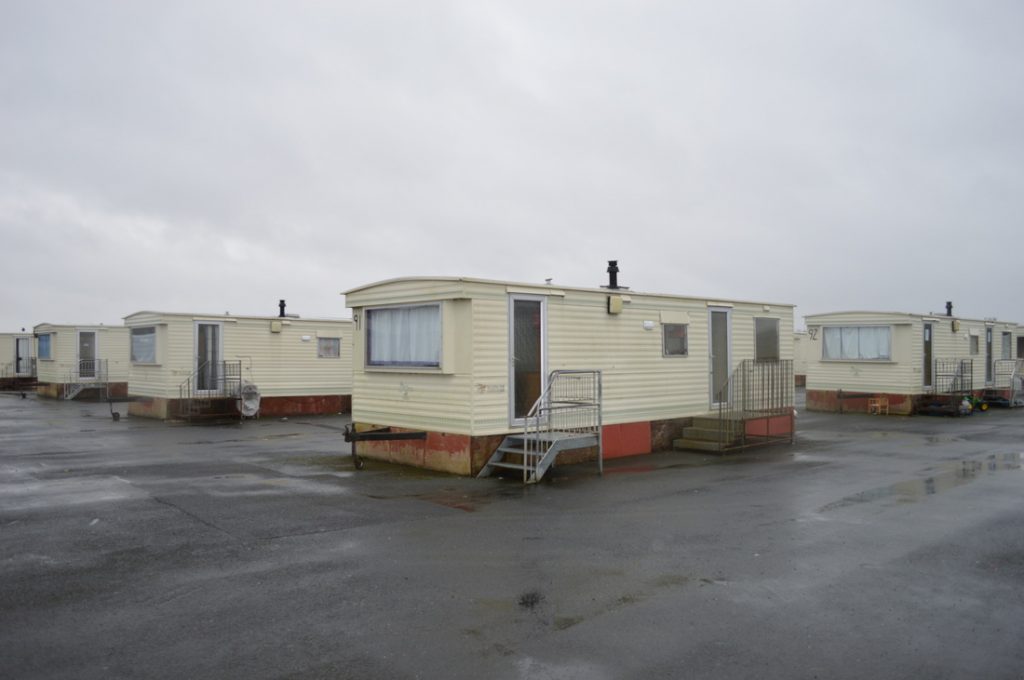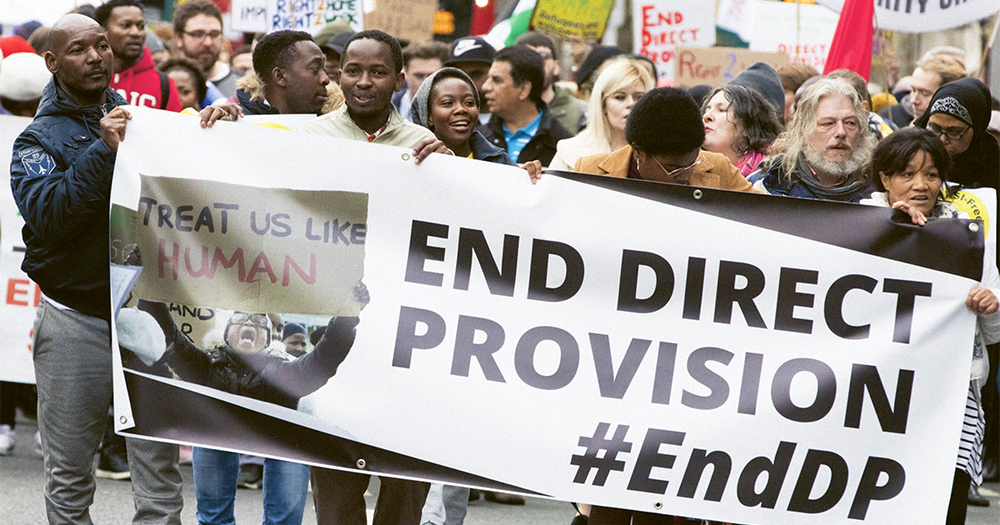In his capacity as Minister for Justice in 2014, Aodhán O’Ríordáin made headlines stating that reform of the Direct Provision system was a “high priority” for the government. Five years later, little has changed except that Direct Provision centres are now more overcrowded than before.
That’s before we even mention those people who went so far as to burn down the Rooskey hotel in January this year rather than see it house asylum seekers. And while the labour market may have been opened up to asylum seekers in 2018, humanitarian professionals have observed this is “20 years overdue”.
Either way, the grim institutionalised settings of the Direct Provision buildings themselves remain the same. Children play in the corridors with nothing to do and nowhere to go. People have to return to their bed every night unless they get explicit permission to go elsewhere. Our asylum seekers receive a weekly expenditure of €38.80.
That amount continues to place all asylum seekers in an economic position of great vulnerability, unable to save or make longer term plans. And it’s those longer-term plans that make the economic future of asylum seekers so precarious which are crucial to take into account.
In the past, in conversations with LGBTQI+ people in Direct Provision, I had been struck by the powerful sense of resilience and perseverance they demonstrated in the face of racial profiling and homophobia within the system. This time around, I wanted to talk to someone who had been through that system and faced the obstacles that awaited on the other side.
Lamin, a gay man from Gambia, came forward to share his story. As Lamin shows, the survivor mode mentality of ‘just getting on with it’ – now acknowledged as psychologically engrained in the process of institutionalising those in Direct Provision – can only take you so far.
While there has been public outcry about the appalling conditions in some of the DP centres, few people ask, ‘what happens next?’ Not enough attention has been paid to the role of the state in the structural fallout of support for asylum seekers – and consequently causal factors – in entrenching pathways to economic precarity. Lamin opened up to me about life after Direct Provision as a gay man, and the many structural barriers he faced upon trying to get housed and settled in Ireland after living in DP for six years.
He recalls: “It took a month or two after I got permission to remain [in Ireland] to be asked to leave Direct Provision. Even though I hadn’t received my GNIB card yet (the GNIB card acts as proof of status and eligibility for employment). So, after I got the Minister’s letter I made an appointment with the GNIB office. I was getting letters to leave Direct Provision even though I didn’t have my GNIB to hand. There were no organisations or signposts for anywhere to go to get help. There was nothing at all.”
The sense of malaise Lamin experienced in Direct Provision can be exemplified by just how eager he was to leave: “The very same day I got my GNIB, I left. I moved to a friend’s house and I crashed there. I just couldn’t wait to get out of Direct Provision. I was desperate to get out. You can’t be yourself there.”
However, procuring a GNIB card and settling into Ireland in the current housing climate are two very separate things. Lamin was desperate for some independence, and he has made every effort to find somewhere that would accept the Housing Assistance Payment (HAP). As he was to find out, there’s a huge amount of discrimination in the rental market when it comes to HAP properties. Landlords have no incentive to take on a HAP recipient as a tenant, generally resulting in a biased choosing of a tenant with a full-time job.

Lamin had little choice in the matter: “There’s a lot of discrimination in finding a place to stay. The first thing they ask you, as you’re talking to a landlord over the phone is: ‘Where are you from?’ And ‘What do you do?’ And that’s even when you talk directly to the landlord. And then you say ‘I’m on HAP’, and they just reply ‘we don’t take HAP’.”
The frustration felt by Lamin was echoed by his statement: “All of my time in Direct Provision was not counted as residency in Ireland. I couldn’t get a landlord’s reference, because I had never rented in Ireland. I couldn’t get a work reference because I wasn’t allowed to work. I was thinking ‘if I had only had the opportunity to work, I would have a work reference and wouldn’t need any help from anyone. I could be supporting myself by myself’.”
In 2018, the //Beyond McMahon// report was published which outlined the structural vulnerability of asylum seekers who are phased out of integration and employment. It acknowledged the profound psychological suffering and subsequent trauma, such as PTSD, which can come from the outrageously elongated waiting times for those in Direct Provision. However, the reform suggested in the report – to minimise the waiting time for asylum seekers – came a little too late for Lamin.
In his own words: “I fell into a depression. I hadn’t been able to save from the €20 or so I got every week, and everywhere seemed so expensive.” Lamin’s mental health trajectory follows through with the trauma theory, which states that once you are out of ‘survivor’ mode, and no longer feel yourself to be in immediate danger, the trauma then makes itself known.
Deep in the throes of depression, Lamin decided to turn to the homeless services for a roof over his head. As he recalled, “when I went to the homeless centre I was going to go into the hostel system, but I had a friend who didn’t allow it. They argued I had spent enough time – six years in Direct Provision – and that I couldn’t be going into the same loop. I just wasn’t thinking. I was really low.”
Lamin continued: “After a while, it started to affect me mentally. So I started thinking, ‘I will never ever be able to get a place.’ And then I started getting really, really down. I began to feel as though I was unrecognisable as a person.“
As for Lamin’s housing status, he is eligible for the homeless HAP, but this is little consolation as there are huge barriers in the implementation of the scheme. As Lamin put it, “I was desperate to get out of [DP]. I wasn’t even thinking about money for a two-month deposit – I just knew I had to get out of DP after six years. Finding accommodation was extremely difficult. I couldn’t get the HAP because my address was Direct Provision. I thought I would start with the job seekers allowance, and I moved to another friend’s house, thinking it would take three or four weeks to find somewhere. I’m still here a year later.”

Lamin is just one out of many LGBTQI+ asylum seekers who are finding themselves in these precarious housing conditions. Lamin was not given the chance to work; he was not given the chance to save, and you can’t get a landlord reference from a Direct Provision centre – it’s a case of being left too long to wait, and in Lamin’s case it was ‘Catch 22’. As he explained to me, he was doing a course in Marketing, whereas back in Gambia he had also gone through university and studied to become a solicitor. His qualifications are unrecognised in Ireland.
An LGBTQI+ asylum seeker who has been offered leave to reside in Ireland needs some time to recover from the trauma of Direct Provision. Some of them have never even been to a gay bar. Lamin has been prone to flashbacks – a red flag for PTSD – from the Direct Provision centre, he lived in for so long. It is crucial that housing supports be put in place to stop the pathway for LGBTQI+ individuals leaving Direct Provision only to go directly into homelessness.
Time is needed to let the dust settle over the hotbed of depression, inertia and inaction that is the Direct Provision system. Just as it takes roughly six months to become institutionalised under a strict regime, it can take even longer to re-acclimatise, often after so many years, to a radically different environment. Those fleeing from persecution on LGBTQI+ grounds are often very vulnerable, given the credence with which homophobia is afforded around the world.
Besides doing nothing to prepare our globally vulnerable LGBTQI+ asylum seekers for life outside of Direct Provision, it must be remembered that Direct Provision in the first instance can be the cause of deep psychological distress, leading to homelessness and extreme economic precarity. It has also been observed that LGBTQI+ individuals are over-represented in homelessness. To go directly into the homeless system was a near miss for Lamin. And in light of his suicidal thoughts after visiting the homeless offices, I dread to think what could have happened to Lamin had he been forced to enter the toxic chaos of the homeless shelters.
This story originally appeared on GCN’s May 2019 issue. Read the full issue here.
© 2019 GCN (Gay Community News). All rights reserved.
Support GCN
GCN is a free, vital resource for Ireland’s LGBTQ+ community since 1988.
GCN is a trading name of National LGBT Federation CLG, a registered charity - Charity Number: 20034580.
GCN relies on the generous support of the community and allies to sustain the crucial work that we do. Producing GCN is costly, and, in an industry which has been hugely impacted by rising costs, we need your support to help sustain and grow this vital resource.
Supporting GCN for as little as €1.99 per month will help us continue our work as Ireland’s free, independent LGBTQ+ media.
